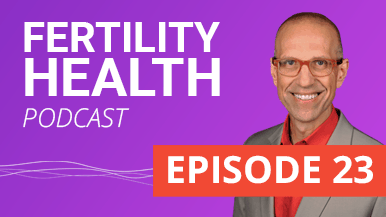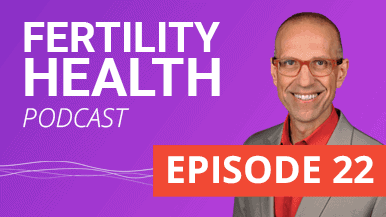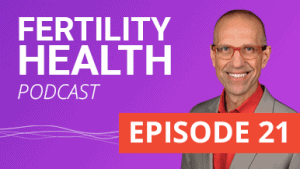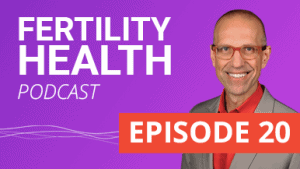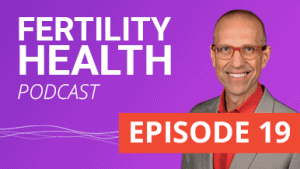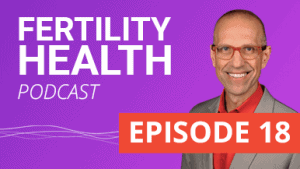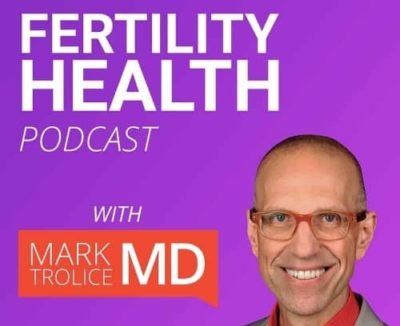 Planning to have a baby is a significant undertaking. Of course, you want to ensure a smooth and healthy pregnancy, but what steps can you take before and during pregnancy to achieve that?
Planning to have a baby is a significant undertaking. Of course, you want to ensure a smooth and healthy pregnancy, but what steps can you take before and during pregnancy to achieve that?
In this episode, Brooke Rossi, M.D., a board-certified reproductive endocrinologist and infertility specialist, joins host Mark P. Trolice, M.D., to discuss the impact that lifestyle plays on fertility and what lifestyle changes individuals can implement to maximize their chances of getting pregnant. Listen in as she shares insights on everything from the effects of body weight, alcohol consumption, and smoking on IVF, to herbal supplements, genetic testing, and diet.
Tune in to discover:
- The importance of lifestyle on fertility
- How to ensure that you’re entering pregnancy safely for yourself and your baby
- The lifestyle factors that inhibit fertility in both men and women
- How your OB/GYN can help you plan for a successful and healthy pregnancy
- The vaccines you need to protect you and your baby during pregnancy
About Brooke Rossi, M.D.
 Dr. Brooke Rossi has been a board-certified reproductive endocrinologist and infertility specialist for over 10 years. She is a graduate of the University of Pittsburgh School of Medicine and completed her residency in Obstetrics and Gynecology at the University of Rochester. Her subspecialty fellowship in REI was completed at Brigham and Women’s Hospital, Harvard Medical School. During her fellowship, she was awarded the American Society for Reproductive Medicine In-training Award for Research on her project reviewing the effects of alcohol and in vitro fertilization outcomes.
Dr. Brooke Rossi has been a board-certified reproductive endocrinologist and infertility specialist for over 10 years. She is a graduate of the University of Pittsburgh School of Medicine and completed her residency in Obstetrics and Gynecology at the University of Rochester. Her subspecialty fellowship in REI was completed at Brigham and Women’s Hospital, Harvard Medical School. During her fellowship, she was awarded the American Society for Reproductive Medicine In-training Award for Research on her project reviewing the effects of alcohol and in vitro fertilization outcomes.
She is now in private practice at Ohio Reproductive Medicine in Columbus, OH.
Her clinical interests include infertility, IVF, recurrent pregnancy loss and PCOS. She has a special research interest in lifestyle factors and fertility and in vitro fertilization. She has been published in Obstetrics and Gynecology, Fertility and Sterility, and the Journal of Clinical Endocrinology and Metabolism.
About Mark P. Trolice, M.D.
Mark P. Trolice, M.D., FACOG, FACS, FACE is Director of Fertility CARE: The IVF Center in Winter Park, Florida and Associate Professor of Obstetrics & Gynecology (OB/GYN) at the University of Central Florida College of Medicine in Orlando responsible for the medical education of OB/GYN residents and medical students as well as Medical Endocrinology fellows. He is past President of the Florida Society of Reproductive Endocrinology & Infertility (REI) and past Division Director of REI at Winnie Palmer Hospital, part of Orlando Health.
He is double Board-certified in REI and OB/GYN, maintains annual recertification, and has been awarded the American Medical Association’s “Physicians’ Recognition Award” annually. He holds the unique distinction of being a Fellow in all three American Colleges of OB/GYN, of Surgeons, and of Endocrinology. His colleagues select him as Top Doctor in America® annually, one among the top 5% of doctors in the U.S. In 2018, he was awarded the “Social Responsibility Award” by the National Polycystic Ovary Syndrome Association. For ten years his foundation, Fertile Dreams, organized seminars to increase fertility awareness and granted national scholarships for those unable to afford in vitro fertilization (IVF) treatment.
Dr. Trolice serves on committees for the American Society for Reproductive Medicine and the Society for Assisted Reproductive Technology as well as the editorial advisory board of Ob.Gyn.News. He has conducted scientific studies with resultant numerous publications and been appointed a reviewer in many leading medical journals and textbooks. He has lectured at numerous physician and patient seminars around the country. In addition, he is interviewed regularly on TV news/talk shows, radio, podcasts, print/online magazines and newspapers on reproductive health topics. His current book is on the Infertility journey to be published by Harvard Common Press in mid-2019.
Transcription Notes
Announcer: Thanks for tuning in to the Fertility Health podcast, hosted by renowned fertility specialist, Mark Trolice, MD. Each episode features first hand advice and potential treatment news: tips and strategies listeners can use on their fertility journey. And now here’s your host, Dr. Trolice.
Dr. Mark T.: Hi, everyone and welcome to another Fertility Health podcast. I’m your host, Dr. Mark Trolice. And today we’re going to be speaking about fertility and lifestyles. So really what I would call prep for pregnancy. Trying to conceive or when you’re planning to have a baby, it’s really a tremendous responsibility to ensure that you and baby are the healthiest to maximize a good outcome.
Dr. Mark T.: And so, I wanted to bring a good friend on who is very, very interested in this area of research and optimizing pregnancy outcomes by addressing lifestyle and behavior modifications before pregnancy. And so, we have with us today Dr. Brooke Rossi, who is a board certified reproductive endocrinologist and infertility specialist. She graduated University of Pittsburgh School of Medicine and completed their residency in Ob-Gyn at the University of Rochester. Then went on to do a fellowship at Brigham Women’s Hospital, Harvard Medical School.
Dr. Mark T.: So her research interests, she had a prize paper on the effects of alcohol and IVF outcomes. We’ve talked a lot about this whenever we get a chance to get together. Her interests are, fertility, lifestyle factors and infertility, IVF and recurrent miscarriage. She’s now in private practice at Ohio Reproductive Medicine in Columbus, Ohio. So Brooke, thank you for joining us on the Fertility Health podcast today.
Dr. Brooke R.: Thank you, Mark. It’s great to be with you.
Dr. Mark T.: Yeah, great to have you. And, so how much do you think is given, how much of an emphasis do you think is given on the pre-conception counseling when we see these patients? The Ob Gyn obviously has a little bit of a more optimal time, to address that. So if they basically say, would you like to become pregnant in the next year, they may have the opportunity, to address these factors that you’re going to talk to us today about.
Dr. Mark T.: But what about the reproductive endocrinologist? Do you think we have enough time to be able to do this, given the expediency these patients want to try to conceive?
Dr. Brooke R.: Well, I think it depends on which factor you’re talking about. I think in a perfect world, you know, a year before someone’s ready to conceive, they would check in with their ob-gyn. They would go through their medical history, check the medications that they’re on and have a conversation with them about what they can do to help their bodies get ready for pregnancy.
Dr. Brooke R.: But sometimes what happens is people don’t have a regular gynecologist. They find a reproductive endocrinologist that maybe a friend used and then they show up to us. And you know, infertility treatment can be stressful and it can be expensive. And I think the idea is one, how do we make sure that the woman is safely entering pregnancy for herself and for the baby?
Dr. Brooke R.: But two, how can we, are there any things that she can do to help optimize her success with treatment and make it more likely that she conceives with a treatment that we’re offering her? So some of the factors like smoking, I mean, hopefully we could get a patient to stop smoking over the course of months. Other factors like maybe someone who’s been struggling with her weight for years and years and years, that may take a little bit longer to help that patient.
Dr. Mark T.: Let’s stay with that. That’s a good segue. So, alcohol and nicotine products, even recreational drugs, what are the effects that these are going to have on pregnancy and fertility and also pregnancy outcomes?
Dr. Brooke R.: So let’s talk about women first, because a lot of these different factors affect men and women, sometimes in different ways. We probably know the most about smoking and we know that smoking not only affects fertility, but also greatly affects pregnancy outcomes and it can increase your risk of miscarriage, preterm delivery and other complications in pregnancy.
Dr. Brooke R.: And they’ve even done studies where they’ve looked at the follicular fluids, the fluid around the egg as it’s developing and they can even see evidence of tobacco use and what’s in cigarettes in that fluid around the egg. So we know that these factors get throughout our whole bodies and they can affect outcomes with fertility and they definitely decrease your chance of getting pregnant with IVF as well. So it’s definitely possible with women. With men, we can see an impact on their fertility as well. And often urologists will recommend that men at least quit smoking and sometimes decrease other types of tobacco when they’re trying to conceive as well.
Dr. Mark T.: Yeah, it seems like tobacco is having a genetic impact on the eggs and the sperm and we know obviously for the woman miscarriage and tubal pregnancy, but it’s terribly addicting. Just devastating for them. And I try to say with sensitivity but also with some emphasis is that, you know, what would you rather be holding, you know, a cigarette or baby because sometimes the cigarette smoking, we know has a negative impact. But what is encouraging is that after a year of stopping, studies seem to demonstrate that fertility is restored to baseline.
Dr. Mark T.: What are you telling your female patients about alcohol? There just doesn’t seem to be a great consensus. We know any alcohol during pregnancy is worrisome and can cause, obviously fetal alcohol syndrome with mental retardation. But are you saying that before pregnancy, yeah, you can have an occasional glass of wine or strictly avoiding any alcohol at all?
Dr. Brooke R.: So the studies and the data on alcohol and fertility are kind of all over the map, to be honest with you, especially with different types of alcohol, whether the men are using or whether the women are using. The study that we did looked at IVF and alcohol outcomes and we found that that if patients were drinking four or more drinks per week, that it had a negative impact on their chance of getting pregnant with IVF. So, sometimes I will extrapolate that to kind of regular fertility and just tell the patients, “Hey, the data on alcohol use and fertility is not good, but let’s try to keep it at least less than four drinks a week.”
Dr. Brooke R.: Now, I’ll also mention to remind them that after they ovulate in that two week window, they could become pregnant and they might not know it yet. So I do try to encourage them, as you’re saying, because no amount is safe in pregnancy, I’ll tell them, you know, really try not to drink in those two weeks after you’ve ovulated, as well.
Dr. Mark T.: Recently, you probably saw it as well, there doesn’t seem to be a known detrimental effect on the outcome with use of marijuana. I mean, now that medical marijuana and the use of marijuana seems to be much more acceptable and legal. I’m not seeing evidence that impairing outcome. What are you seeing?
Dr. Brooke R.: I’m seeing the same kind of confusing studies and data. I think the national organization, the um, the College of Ob Gyn and [inaudible 00:07:55] are still recommending that people not smoke during pregnancy, not use marijuana during pregnancy, but in terms of fertility, the studies are really hard to make out in terms of, you know, if you have a patient telling them how much is safe, if at all.
Dr. Brooke R.: The other topic I think is kind of interesting is, you know, a lot more patients are using electronic cigarettes now or vaping and we have very little data on that as well. I mean, sometimes people do that because they think it may actually be safer than smoking cigarettes, but there’s still a lot of chemicals in the fluid that they’re vaping with. And I don’t think we know if that’s safer or any better than tobacco. We just don’t have the data on it.
Dr. Mark T.: Right. Yeah, absolutely. Let’s switch over to some medical issues. I think it’s clear that if a woman has an unstable medical problem, we’re talking about diabetes, hypertension, thyroid disease, even psychiatric illness that’s unstable, not a good idea to go into a pregnancy like that. So that’s the counseling that we address and get them optimized. So when we tell the patients we need to get that addressed, we’re not saying that you can’t get pregnant.
Dr. Mark T.: And there are very few diseases that are real contra-indications to pregnancy, but we just want it to get more optimal. But medications that they’re on, those are important, because of what’s called pregnancy categories and a lot of the patients don’t know that there are pregnancy categories of the drugs that they’re on, that they’re being prescribed. And A of course is the best and nobody’s an A, but B is as good as it gets. And there are some Bs. C. we’re getting much more concerning about the risks. D, really have to have a tremendous justification because of the risk of birth defects and X, of course is contra-indicated.
Dr. Mark T.: Given that with medicines. What about the herbs of that some of these patients are taking? Are there any herbs that you would say, Brooke, that look, I don’t think you should be on this for pregnancy?
Dr. Brooke R.: So a couple things about that. Sometimes people will read on the Internet about different medications that are quote like ‘hormonally’ active and they think they might be safer than what we would give them. And a lot of times, I mean either one of two things. One, either it’s not working, in which case it’s not going to help you or two, it actually does work. And then you’re taking a medicine that’s hormonal, which may not be working the way you want to or may interact with the fertility medicines we’re trying to give. So if I’m treating somebody with you know, medications, IVP medications or clomids, clomiphene citrate, something like that, I will often ask them to stop if they’re taking any medicines they think are hormonal. Sometimes I also find that patients will kind of take them incorrectly, like they may find progesterone gel on the internet and be using it every day of the month, which is not physiological or helpful and they may actually be making it harder for them to get pregnant.
Dr. Brooke R.: So I think it’s very important. I always ask my patients if they’re taking any medicines and then I say, are you taking any supplements? Because sometimes they don’t think the supplements are medicines and sometimes, they’re almost a little bit embarrassed to tell the infertility doctor what they’re taking. And I would say though that, although the data on acupuncture and that sort of thing is again, not well-established, I have worked with acupuncturists in the past and I’ve trusted them and I know what they’ve been giving patients. I know it’s not affecting their treatment. And so depending on that situation I may feel it’s okay to have them take that as long as I know what they’re taking. So I think it just depends on what patients are are taking, but it’s a really important to ask and find out so you can counsel them.
Dr. Mark T.: Yeah. Excellent. And I want to underscore the progesterone. I can’t believe the numbers of patients who are getting progesterone and do not realize that if they take that all cycle, that’s contraceptive, because of the negative impact that’s having on the lining of the uterus. So great that you brought that up.
Dr. Mark T.: And also acupuncture, you know, I was very enthusiastic, like we all were in the beginning when the studies were coming out suggesting higher result outcome pregnancy rates, but a more, more and more studies are showing that we’re not getting definitive improvement in the live birth rate. So what I tell patients is that, hey, you know, if it makes you feel good, absolutely continue doing it. But I can’t give you the reassurance that it’s increasing your chance for baby.
Dr. Brooke R.: Correct. So it comes down to, I don’t want them to ever feel obligated to spend their time or the money doing that because I can’t guarantee that it’s going to increase their chance. If they want to, they can feel free.
Dr. Brooke R.: Mark, could I just go back to the medications for a second?
Dr. Mark T.: Of course.
Dr. Brooke R.: I just want to talk real briefly about medications used for anxiety and depression because those are very common in our patient population. The guidelines from, again, the American College of Obstetricians and Gynecologists, it does say that if women have mental health issues, anxiety, depression, or even other mental health issues, that they oftentimes, I mean, again, they might need adjustment of their medications or to change their medications, but they should never just stop their medications because actually babies and moms do better when moms stay on medications and their conditions are well-treated.
Dr. Brooke R.: So sometimes I’ll see patients who will say, “I’m going to try to get pregnant, I’m going to get off of my anxiety medication.” And you know, infertility treatment, it’s a very hard thing to do. And often I will encourage those patients to stay on their medications. Maybe make adjustments to make sure they’re on the safest one we can put them on, as you talked about, pregnancy classes. But I just try to make sure that women know that there are situations in which we want them to stay. Blood pressure medication is another example. Like, they should stay on their medication, might need to be changed with different ones, but it’s important that they stay healthy as they’re trying to get pregnant.
Dr. Mark T.: Yeah. Excellent points. Thanks, Brooke for clarifying that.
Dr. Mark T.: So something else to talk about. What we’re seeing tremendous amount of new products that are coming out for gene testing, chromosome testing. What are you recommending to patients? The American College of Ob-Gyn, really seems to recommend just cystic fibrosis testing and spinal muscular atrophy, as the main two. But now there’s hundreds that can be tested. Are you seeing a lot of patients opting to do that?
Dr. Brooke R.: I think it really depends on the patient and the counseling that they receive. We do do that in our office, what they call carrier screening, and just to clarify, that’s screening the woman and the man to see if they could potentially pass on a potentially fatal disease to their children and we test often as they’re trying, or especially before IVF because if they actually were carriers then they could test those embryos to make sure they weren’t getting pregnant with embryos that are affected by these diseases.
Dr. Brooke R.: When I offer it to patients, I will often tell them, I just give them the options. I think a lot of patients will choose to do it. If they choose not to do it, I will often say this will also be offered when you get pregnant during your prenatal visit.
Dr. Brooke R.: But if they choose to do it, I will say, you know, often for the same price, patients can have these recommended whatever, eight or 10 things checked or you can have these 200 things checked. But I always remind them that sometimes the more you look for, the more you find and that might mean that they’ll undergo more testing. But you know, I think it’s really up to the patient in terms of what they’re comfortable with.
Dr. Mark T.: Yeah. So for our listeners to know, if you and your partner carry the same gene, you don’t have the disease, but you’re both carriers, then baby has a 25% chance of having the disease. And that can be screened, either through in vitro fertilization with pre-implantation genetic diagnosis or even during the pregnancy. So that’s the kind of things that we look at.
Dr. Mark T.: I just want to touch briefly on vaccines. All pregnant women should ensure that they have their annual flu vaccine. Yeah, absolutely. And also make sure that you’re immune to the German measles, not a common virus, but when, when it does occur during pregnancy, it’s devastating what potential birth defects and mental retardation. Chicken pox you want to be vaccinated for, or at least ensure that you’re immune. Hepatitis B, the Pertussis Vaccine, D-Tab, as well.
Dr. Mark T.: So, please be aware of that. And just to touch upon one more thing before I get back to asking Brooke a question. When we talked about supplements, please remember folic acid has been shown definitively to reduce the risk of neuro-tube defects, spina bifida, and 800 micrograms actually may improve fertility. So please ensure that you’re on that. And Vitamin D3 also may have some improvement in fertility and pregnancy health. So supplementing with Vitamin D3, I usually will tell my patients to take on 2000 international units of Vitamin D3. Being in Florida.-
Dr. Brooke R.: Can I just say, just one more thing about Vitamin D, Mark?
Dr. Mark T.: Sure.
Dr. Brooke R.: In some of our patients, remember there’s certain ethnic classes that are more risk for being low Vitamin D. African Americans are one of those classes. And there also might be an association between PCOS and Vitamin D. So often if I have a patient who’s African American with PCOS in my office, I really make sure that I check their Vitamin D because again, just trying to optimize things as much as possible and help them get pregnant may help.
Dr. Mark T.: Excellent. Excellent. Being in Florida, we should remember about Zika. Zika virus is devastating if the infection occurs during pregnancy. And cases have been fortunately dramatically reduced because of the awareness. But if either you or your partner have traveled to a country that is endemic with Zika and you can find out the countries by going on CDC.gov, G-O-V. CDC.gov/Zika, Z-I-K-A. And that’ll show you the places that, that are risks for Zika.
Dr. Mark T.: The woman, if you have traveled there is advised to wait two months before trying to conceive. And the man, now it’s three months. It used to be six months, but now the man needs to wait three months, to ensure that there is a very, very low risk after visiting those countries to reduce the risk of transmission to baby.
Dr. Mark T.: So important topic we move now to is there a fertility diet? And what about BMI? So I’m gonna let you handle those very, very difficult subjects.
Dr. Brooke R.: Okay. So let’s talk about diet and vitamins first. So I wish there was something we could just tell our patients to eat that would help with their fertility, but they’ve looked, they’ve done studies on all kinds of diet, low fat diet, vegetarian Diet, organic diets, high fat diets, enriched diets like keto, what’s the other one? Whole 30, all of that. And none of them seem to really help increase fertility.
Dr. Brooke R.: They’ve done some long term studies on women without fertility where they’ve tried to say, oh, these women had kids and what were they eating during their life? And that’s kind of where some people have read about eating, you know, full fat dairy and that sort of thing. But you just have to remember those were not studies done in infertility patients who then had better fertility after eating this diet.
Dr. Brooke R.: So I think we just want to make sure that people are eating a well-balanced diet, that they’re eating lots of fruits and vegetables, that they’re having good amounts of protein. But you know, a lot of patients feel like they need to go out and spend a ton of money eating only organic or eating really clean. I mean, you know, you try to do the best that you can, but I don’t want anyone to think that they have to eat any special diet or if they’re not eating a special diet that they’re somehow making it harder for themselves.
Dr. Mark T.: Well, there is information that the Mediterranean Diet, not only has it been named that the healthiest diet, but that it does seem to have improved outcome with IVF. All good food, portion control but fish instead of chicken and red meat and legumes and nuts and berries and olive oil and all the things I love. Brooke is a fellow Italian, so we all love those kinds of foods.
Dr. Mark T.: So Brooke, the extremes of body weight, pretty difficult for, or rather its impact on fertility. Can you speak to that as we finish up here?
Dr. Brooke R.: If patients can imagine, they always say that, well, they talk a lot about body mass index and they always say that it looks like an upside down U. So if you think about an upside down U and the people who are kind of in the middle have the greatest chance of getting pregnant and the people who are at either end, so either low body weight or high body weight have a lower chance of getting pregnant.
Dr. Brooke R.: And also patients who are very low body weight sometimes can have a higher risk of miscarriage as well. And then we know that there is impacts on fertility and pregnancy outcomes when patients have a greater body weight and they have done some studies looking at IVF as well. So overall fertility then especially in vitro fertilization, looking at decreased fertility or decreased chance of getting pregnant with IVF. One of the studies that I always talk to patients about is they say that for every point your body mass index is over 30, it’s like a point off of your chances of IVF.
Dr. Brooke R.: So if you had a woman who, you know, other people who are same age, her chance of getting pregnant with IVF was 40%, but if for body mass index was 35, she may have a 35% chance, not a 40% chance.
Dr. Mark T.: The interesting is that over the last year, I’ve been coming across for some medical studies to show that the impact of BMI, elevated BMI in IVF is not to the degree that we once thought, but it does not remove the concerns of the risks during pregnancy, like the high blood pressure and the diabetes and risk of C-Section and miscarriage and such. So, definitely we’re encouraging body weight to be optimal. And unfortunately, given the prevalence of obesity in the United States, about almost 40% of adults being that way, not everybody’s realizing that they are overweight because it does seem like there are more that are experiencing issues with elevations of body mass index.
Dr. Mark T.: But it’s important to realize that it’s not just the elevations, it’s the low body weight, particularly in athletes that are not taking in enough calories and they’re getting into an energy deficit. So there is a sweet, sweet spot of body weight to optimize pregnancy outcome.
Dr. Mark T.: Well, this was just a plethora of information. And I want to than my special guest Dr. Brooke Rossi. She is in private practice at Ohio Reproductive Medicine in Columbus, Ohio. And so if you are in that area experiencing fertility issues, you please make sure that you look up Dr. Rossi.
Announcer: Thanks for listening to the Fertility Health Podcast. If there’s anything from today’s show you want to learn more about, check out TheIVFCenter.com for all the notes, links and tips mentioned in this episode.
Announcer: If you’re not already subscribed to the show, please press the subscribe button on your podcast player so you don’t miss a future episode. And if you haven’t given us a review or rating on iTunes yet, consider leaving us a five star review to help us reach and educate even more individuals in need. Thanks again for listening and we’ll see you next episode.

